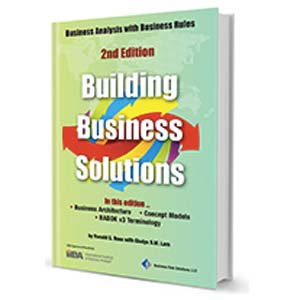SBVR Speaks on Rules: Rules and Advices
What is a rule in the real world rather than in software? According to SBVR, rules always act so as to remove some degree of freedom. The degree of freedom removed by a rule might concern the behavior of people, or the correct understanding of concepts. You can also express where a degree of freedom does exist, which SBVR calls an 'advice'. Think of an advice as an 'un-rule' or 'no-rule'.
The following material is excerpted from the OMG standard Semantics of Business Vocabulary and Business Rules (SBVR), Version 1.4, pp. 97 and 119.
Rules
The common sense understanding of 'rule' is that a rule always tends to remove some degree of freedom. This common sense understanding should be contrasted with that for 'advice', where a degree of freedom is never removed, even potentially.
The degree of freedom removed by a rule might concern the behavior of people (in the case of a behavioral business rule), or their understanding of concepts (in the case of a definitional rule). In the latter case, the restricting of freedom is built-in (i.e., "definitional" or "by definition"). In the former case, people can still potentially violate or ignore the rule — that is a matter of free will, appropriate enforcement, and sometimes discretion (for example, if the rule is offered simply as a guideline or suggestion).
Nonetheless, a behavioral business rule always mandates or suggests some out-of-bounds criteria for behavior, thereby potentially removing a degree of freedom. For example, the meaning of "It is prohibited that an order be paid by promissory note" indicates that workers are not completely free to accept IOUs for payment of orders. That particular degree of freedom has been removed or diminished. Depending on enforcement level, violating the rule could well invite response, which might be anything from immediate prevention and/or severe sanction, to mild tutelage. Note that other degrees of freedom have not been removed or diminished by this particular rule. For example, unless other rules pertain to how orders are paid, workers are free to accept cash, credit cards, or other means of payment — those means are allowed. The general implication is that rules indirectly prescribe what is allowable — whatever the rules do not specifically proscribe is allowed.
Advices
An advice is just the opposite of a rule. Whereas a rule always potentially removes some degree of freedom, an advice always confirms or reminds that some degree of freedom does exist or is allowed. That degree of freedom might concern the behavior of people (in the case of a behavioral business rule), or their understanding of concepts (in the case of a definitional rule).
Example of an advice of permission in a bank: There is no rule that a person must be over some given age in order to open a savings account: "There is no minimum age for opening a savings account." This is understood as an advice of permission because 'minimum age' is defined as "age that must be reached in order to take part in a given activity" and no restriction has been placed on it. In other words, the behavior 'opening a bank account' is not to be disallowed based on age.
It might be helpful to think of an advice as an 'un-rule' or 'no-rule'. For example, the meaning of "It is permitted that an order be paid by cash" is that such behavior is allowed — that indeed, paying by cash is acceptable. In other words, there is (or should be) no rule to the contrary.
Since an advice never removes degrees of freedom, why is it sometimes useful to capture? There are many possible reasons, but probably foremost among them are to re-assure workers or others that some degree of freedom does exist; to use as a basis for admonishing workers about applying some rule that actually does not exist; or to 'remember' the resolutions to some rule-related issue where the outcome was in favor of 'no rule'.
# # #
About our Contributor:
Online Interactive Training Series
In response to a great many requests, Business Rule Solutions now offers at-a-distance learning options. No travel, no backlogs, no hassles. Same great instructors, but with schedules, content and pricing designed to meet the special needs of busy professionals.











How to Define Business Terms in Plain English: A Primer
How to Use DecisionSpeak™ and Question Charts (Q-Charts™)
Decision Tables - A Primer: How to Use TableSpeak™
Tabulation of Lists in RuleSpeak®: A Primer - Using "The Following" Clause
Business Agility Manifesto
Business Rules Manifesto
Business Motivation Model
Decision Vocabulary
[Download]
[Download]
Semantics of Business Vocabulary and Business Rules